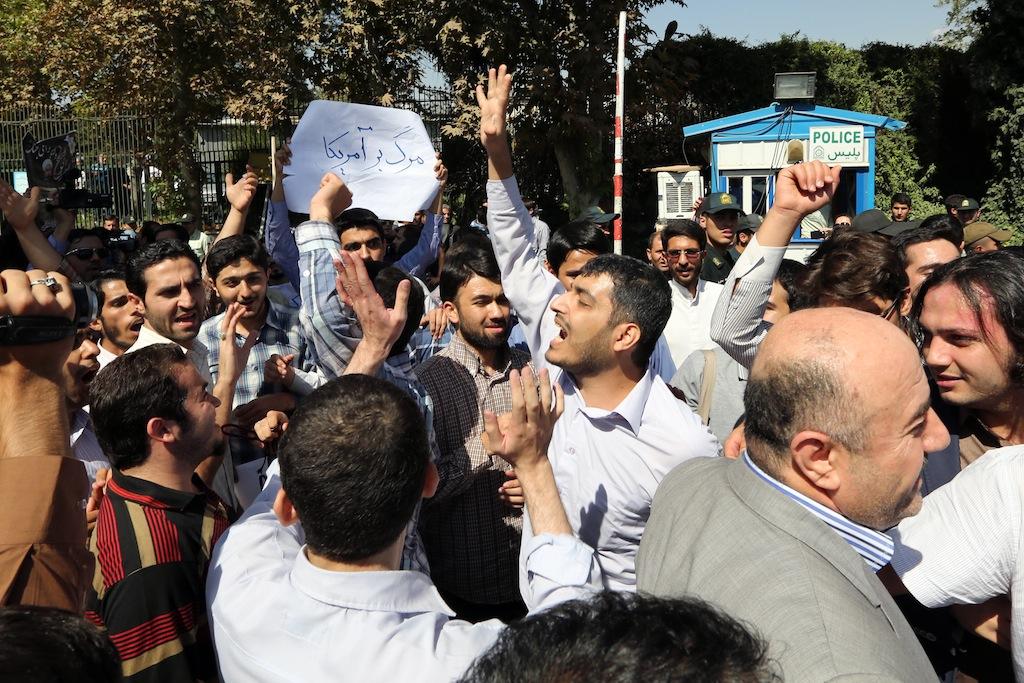US gov’t shutdown complicates Iran sanctions (VIDEO)
Iranian supporters of the Basiji militia shout anti US slogans as Iranian president Hassan Rouhani arrived from New York, on September 28, 2013 in Tehran. Some 60 hardline Islamists chanted ‘Death to America’ and ‘Death to Israel’ but they were outnumbered by 200 to 300 supporters of the president who shouted: ‘Thank you Rouhani.’
JERUSALEM — Who will decide whether the sanctions currently crippling Iran's economy will be reinforced?
For now, despite strong belief in the US and abroad about the need for sanctions, it appears the amorphous forces of the US government shutdown are calling the shots.
After promisingly moderate rhetoric from Iranian President Hassan Rouhani and a historic phone call between the new leader and President Barack Obama last week, the United States is hinting at the possibility of sanctions relief for Iran — possibly is as few as 10 days.
Israeli prime minister Benjamin Netanyahu, who arrived back in Israel Friday following his speech at the United Nations earlier this week, argued that sanctions against Iran — punishment for flouting the UN and Western powers about the nature of its nuclear facilities — need to be strengthened, or at least to stay as they are. "The world mustn’t fall for the Iranian ploy and alleviate the sanctions as long as the Iranians do not dismantle their nuclear program," he said.
The discussion has been rendered moot, however, by the US government shutdown. For now, no one is around to implement the sanctions currently in place.
In fact, the shutdown is impairing a broad array of American efforts against illegal international financial transactions, a Treasury Department official told ABC News.
“This massively reduced staffing not only impairs OFAC’s ability to execute its mission, it also undermines OFAC's broader efforts to combat money laundering and illicit finance, protect the integrity of the U.S. financial system, and disrupt the financial underpinnings of our adversaries,” the official, who asked not to be named, told the network.
"For all the talk in Congress about keeping up the sanctions pressure on Iran, Treasury’s Office of Foreign Asset Control — OFAC, as we refer to it — has furloughed nearly all of its staff,” State Department spokeswoman Marie Harf said on Thursday, underscoring the irony of the situation. “OFAC’s colleagues in the Office of Terrorist Financing and Financial Crimes, the Office of Intelligence and Analysis, and the Financial Crimes Enforcement Network, are also working with just a skeleton crew," she added.
"We think this is unhelpful, a contradictory message to send at a time when everyone is looking to see whether a combination of tough sanctions on the one hand and equally tough diplomacy can push Iran to address the world’s concerns about its nuclear program," she said.
Nevertheless, Speaking before a Senate panel Thursday, Under Secretary of State Wendy Sherman, the chief US nuclear negotiator, asked Congress to stave off introducing additional sanctions before Oct. 15, when Germany and the permanent members of the UN Security Council, collectively known as the P5+1, are scheduled to next meet Iranian officials.
"What we are thinking through is, what is it that would give us some confidence today, would put some time on the clock, stop their nuclear program from moving forward, while we get to that comprehensive agreement that would allow the full sanctions relief they are looking for," Sherman said.
Watch Sherman discuss the effect of the shutdown on sanctions in this State Department video:
Every day, reporters and producers at The World are hard at work bringing you human-centered news from across the globe. But we can’t do it without you. We need your support to ensure we can continue this work for another year.
Make a gift today, and you’ll help us unlock a matching gift of $67,000!
